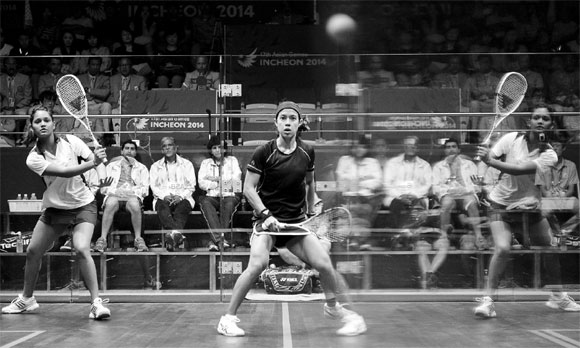Niche sports feeling the chill
Updated: 2014-09-29 07:35
By Sun Xiaochen(China Daily USA)
|
|||||||||
Chinese events out of Olympic spotlight struggle to survive, Sun Xiaochen reports from Incheon, South Korea
When the South Korean baseball team completed its Asian Games semifinal against China on Saturday evening, more than 20,000 fans in the home crowd of Incheon's Munhak Baseball Stadium responded with thunderous applause and cheers.
Media groups jostled for camera positions, waiting for post-match interviews of the players.
But the Chinese squad, which lost 7-2 to the host, walked off the field without drawing much attention from the crowd or media.
The contrast did not surprise Wang Wei, a veteran catcher of team China, who attributed the cold reception to the sport's minor status in his country.
"We know the game enjoys huge popularity in South Korea but the incredible turnout at the stadium tonight was still impressive," Wang told China Daily after the match.
"I wish we could've drawn the same attention back in China. But I know it's not going to happen overnight as baseball remains a small sport without much public recognition in the country," said the 35-year-old who has played three Asian Games since 2006.
Without entries to the Olympic program, niche sports in China including baseball, cricket, sepak takraw and bowling are struggling to join the mainstream in China's Olympic-glory-obsessed sports system, in which Olympic events enjoy massive exposure and priority in the allocation of funds and other resources.
Despite its huge popularity in many countries, baseball struggles in China. Its national team competes at the Asian Games in obscurity compared to its gold-reaping swimming, table tennis and gymnastics counterparts, which enjoy high media exposure and massive support during the Asian Games.
The seemingly lack of interest also occurs in cricket, an iconic sport favored in Commonwealth countries such as India and Sri Lanka but which is played by no more than 200 athletes in China, said Ge Tao, a member of the coaching crew of China's Asiad cricket squad.
"The sport is totally new to the Chinese public and people usually confuse it with baseball or softball. There is still a long way to go for the sport to appeal to more people but its non-Olympic status makes that journey even more difficult," Ge said.
Including eight non-Olympic sports in its program, the ongoing Asian Games provides a rare opportunity for athletes engaged in those niche events to share the limelight while honing their skills on an elite level every four years.
To prepare for the Incheon Asian Games, China's sepak takraw national team drafted 29 players mostly from Tianjin University of Sport and the Physical Education College of Zhengzhou University, the only two universities promoting the sport in China, and trained them for four months with limited subsidy and on a shabby court abandoned by the TUS badminton team before the Asiad.
"The situation is really tough as we don't have many resources and support available. But we still value the Asian Games experience a lot as it is our only chance to represent our country in national attire on the world stage," said Xu Mingchi, a men's national team member.
Struggling careers
Only his two-decade-long passion for the game has enabled Wang Wei, a veteran catcher of the Chinese men's national baseball team, to stay committed to a sport with neither Olympic spotlight nor professional prosperity in his country.
"No audience, no sponsor and no media - it's really hard to make a decent living by playing baseball professionally in China but I never thought about quitting because I love the sport so much," said Wang, who signed a minor league contract with the Seattle Mariners of Major League Baseball in 2007 but did not get the chance to play.
Currently playing for the Beijing team as a registered athlete, Wang earns a monthly salary of up to 4,000 yuan ($652), about half of the daily earnings of his Japanese counterpart Yu Darvish, who signed a $60 million contract with the Texas Rangers for six years in January 2012.
"You just can't help making the comparison and feeling upset sometimes (about the difference in earnings). But I know we are far behind the Japanese in the game, so I just stay at ease with what I earn playing baseball in China," Wang said.
But the game was not all that obscure when it started off in China.
Baseball began appealing to Chinese audiences when the National Baseball League was launched in 2002 in a bid to help local talent hone their skills for the 2008 Beijing Olympics.
Those like Wang and current national assistant coach Lv Jiangang witnessed the initial surge of interest in baseball in China when seven teams competed against each other with a certain amount of endorsement funds and a fair amount of public attention in the early years of the league.
"We used to take flights for road games and sometimes had our games broadcast nationwide. It's a far cry from what's happening now," Lv said.
The huge blow hit in 2005 when baseball and softball were collectively voted out of the Olympic program, which hampered investors' enthusiasm and government support.
Due to the lack of funding, the league was locked out in 2011 and has not been reinstated since, leaving more than 600 baseball players on the verge of unemployment.
"The exclusion from the Olympics had a deadly effect on the development of baseball in China. Government appropriation was reduced to just one quarter of the previous amount and the sponsors pulled the plug on funding for the league," said Li Gaochao, deputy head of the administration of handball, hockey, baseball and softball of the General Administration of Sport of China.
Lack of facilities
The quest for better promotion and development seems increasingly tough for other sports left out of the Olympics.
After each of their Asian Games match in Incheon, players of the Chinese women's cricket team will not return to the athlete village. Instead, they will take time practicing on the clay training field outside the competition venue.
"We don't have the standard clay field at home so we try to take the opportunity to practice on it more although we are all tired after a match," said Wang Meng, a 26-year-old cricket player.
Professional cricket balls are also a luxury for the Chinese team as there is no domestic manufacturer producing competition-caliber cricket balls due to the small market.
Chinese players usually use tennis ball or softballs in their cricket training and only use new cricket balls brought by foreign coach Rashid Khan of Pakistan for training matches.
"Cricket is not part of Chinese culture nor an Olympic event. We definitely don't have much support. But I feel that if this game is declared at the national level, it will be a huge improvement," said Khan, who came to coach cricket in China in 2006.
Without being allowed to register as State-funded athletes, cricket players in China have no prize money offered from the governing body at the annual national championships. They only receive limit allowances from their affiliated sports schools or colleges.
Still, young female players endure the blazing sun and grinding workout outdoors to invest their youth in a sport that very few people appreciate in China.
"I think it's beautiful when you fight on the field with another 10 teammates and try to outperform the opponent with not only strength but also wisdom and discipline," said cricket player Zhou Haijie, who teaches children badminton to make a living outside of her cricket training.
Professional challenges
With the possibility of a future Olympic spot up in the air, some of the non-Olympic sports' governing bodies have envisioned the professional development of such sports. But the untapped market and lack of public participation continue to be daunting.
The Chinese National Baseball League was supposed to be reinstated in May following a two-year lockout but that was postponed to mid-October after a major sponsor withdrew from investing in the league, said Li Gaochao, deputy head of the handball, hockey, baseball and softball administration.
"With the small market and thin targeted fan group against the backdrop of Olympic exclusion, a lot of investors stay cautious in investing in baseball, claiming they can't see the future of the event in China," Li said.
But a recent central government call to open up the State-dominated sports industry market is a positive sign for some minor sports to grow outside the State umbrella, said Huang Kai, an executive in charge of sepak takraw under the small-ball administration.
The move, made at a State Council's executive meeting earlier this month, urged scrapping the age-old rules requiring administrative approval for organizing commercial and mass sporting events and called for more freedom for private investors in the sports market.
"For some fun-to-watch events like sepak takraw, we can carry out tests in the market for entertainment sports as commercial figure skating shows and acrobatics performances," Huang said.
But the thin talent pool and unfamiliar market will still hamper any such prospect, said sports marketing and consulting expert Zhang Qing.
"First of all, we just don't have enough high-level players of those niche sports to form a performing group. Although it's fun to watch, I think the sports entertainment market is saturated with many options like basketball, soccer and table tennis," said Zhang, founder of the Key-Sports consulting agency.
"Viewers and consumers won't accept and learn to appreciate new events as quickly as we hope."
Contact the writer at sunxiaochen@chinadaily.com.cn
|
Malaysia's Nicol Ann David (right) watches a shot from India's Dipika Pallikal during the women's squash semifinal match of the 2014 Asian Games on Sept 22 in a photo taken from behind the court's clear glass wall, which created refracted images of the players. Without much government support and private investment, non-Olympic sports such as squash and baseball have failed to gain much traction with mainstream audiences on the Chinese mainland. Manan Vatsyayana / Agence France-Presse |
|
A baseball fan watches a preliminary round baseball game between Taiwan and Hong Kong at the Munhak Baseball Stadium during the 17th Asian Games on Sept 22. Kim Kyunghoon / Reuters |
(China Daily USA 09/29/2014 page6)
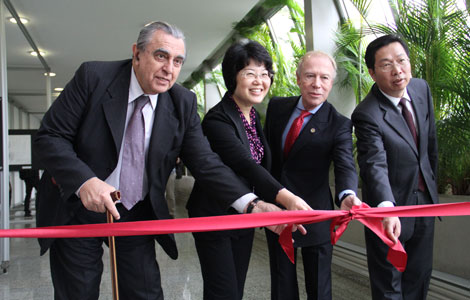
 Brazilian eyes
Brazilian eyes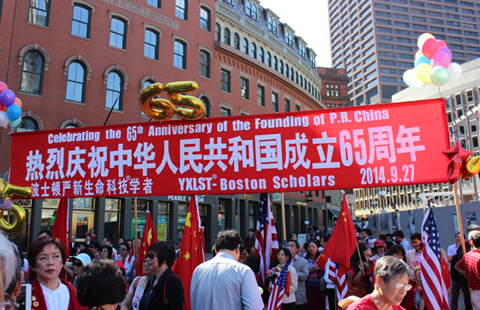
 National Day Celebration
National Day Celebration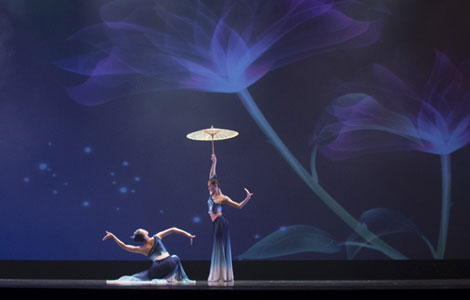
 Splendid China
Splendid China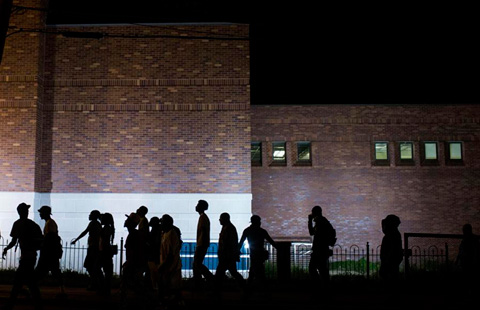
 Police: Ferguson officer shot; 2 suspects wanted
Police: Ferguson officer shot; 2 suspects wanted
 Beijing welcomes its vintage tour bus
Beijing welcomes its vintage tour bus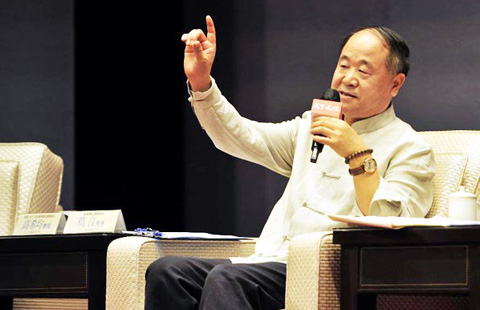
 Mo Yan awarded highest honor of oldest Bulgarian university
Mo Yan awarded highest honor of oldest Bulgarian university
 Hundred Flowers Award ceremony opens in Lanzhou
Hundred Flowers Award ceremony opens in Lanzhou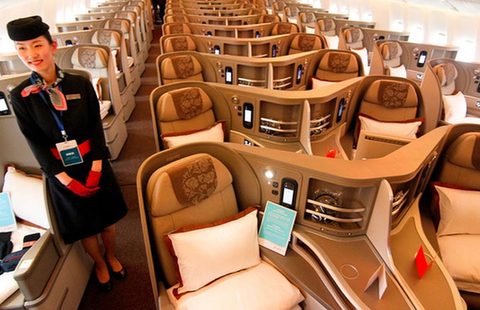
 Luxurious new Boeing 777 delivered to China Eastern
Luxurious new Boeing 777 delivered to China Eastern
Most Viewed
Editor's Picks

|

|

|

|

|

|
Today's Top News
15 people, mostly teens, shot at Miami nightclub
Currency swap potential boon to Argentia
Sino-Venezuela ties at 'highest level'
FM makes official visit to Mexico
Brazil, China exchanges ink deal
VCs gather in Silicon Valley
Police: Ferguson officer shot; 2 suspects wanted
Central govt opposes illegal activities in HK
US Weekly

|

|
